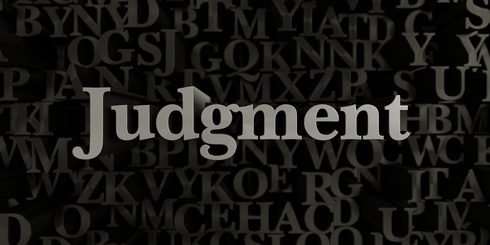The U.S. Court of Appeals for the Sixth Circuit recently affirmed a bankruptcy court’s order granting the debtors’ motion to compel the trustee to abandon their home as property of the estate because it had little equity and thus little value for unsecured creditors. A copy of the opinion in Richard Jahn v. Philip Craig Burke is available at: Link to Opinion. Husband and wife debtors filed a petition under chapter 7 of the Bankruptcy Code, listing their home on their schedules as having an appraised value of $108,000 and a mortgage of $91,581. The bankruptcy trustee moved to evict the…
Posts tagged as “Sixth Circuit”
The U.S. Court of Appeals for the Sixth Circuit recently held that a class could not be certified because the defendant’s alleged liability under the federal Telephone Consumer Protection Act (TCPA) for sending a “junk fax” without an opt-out notice required determination of two individualized issues, which rendered class certification impracticable. In so ruling, the Sixth Circuit concluded that with the absence of a fax log to identity each recipient, and without an alternative method of identifying class members who had provided consent to receive the fax, the plaintiff failed to prove that its proposed class satisfied Fed. R. Civ.…
The U.S. Court of Appeal for the Sixth Circuit recently affirmed the dismissal of a municipality’s public nuisance claims against two different mortgage lenders for allegedly maintaining a policy of violating local and state building codes if the costs outweighed the value added to the eventual resale of foreclosed property. A copy of the opinion in City of Cincinnati v. Deutsche Bank National Trust Company is available at: Link to Opinion. The municipality brought multiple claims against the mortgage lender defendants alleging various claims concerning the maintenance and condition of REO properties. Eventually, through multiple amended pleadings, stipulations and settlements, only one…
The U.S. Court of Appeals for the Sixth Circuit recently reversed the dismissal of a class action lawsuit filed by a bank account holder who asserted that the bank violated the Uniform Commercial Code 4-401 and 4-103(a), dealing with liability for fraudulent checks. The account holder experienced check fraud and the bank refused liability because the master services agreement for the account contained a liability waiver for failure to purchase fraud protection products, which the account holder had not done. A copy of the opinion in Majestic Building Maintenance, Inc. v. Huntington Bancshares Inc. is available at: Link to Opinion. The…
The Bankruptcy Appellate Panel of the U.S. Court of Appeals for the Sixth Circuit recently held that the bankruptcy court lacked subject matter jurisdiction under the Rooker-Feldman doctrine to void the foreclosure of a mortgage lien that was executed by the debtors before bankruptcy, but recorded while the automatic stay was in effect. In so ruling, the BAP held that the mortgage was effective upon signing, the pre-petition lien survived the bankruptcy, the creditor’s exercise of its in rem rights did not implicate the discharge order, and the bankruptcy court incorrectly applied the exception to the Rooker-Feldman doctrine recognized in…
The Bankruptcy Appellate Panel of the U.S. Court of Appeals for the Sixth Circuit recently held that a mortgage foreclosure deficiency judgment lien may be avoided under 11 U.S.C. § 522(f)(2), reversing the bankruptcy court’s ruling to the contrary. A copy of the opinion in In re Antoinette Pace is available at: Link to Opinion. The debtor filed a chapter 13 bankruptcy, listing her residence in Ohio on her schedules with a value of $147,630. She also claimed the residence as exempt homestead in the amount of $132,900, the maximum allowed pursuant to Ohio law. On her Schedule D, the debtor…
The U.S. Court of Appeals for the Sixth Circuit recently concluded that Michigan’s assignment of rents statute sufficiently deprived the assignor of the ownership of the rents such that the rents could not be included in the assignor’s bankruptcy estate. The primary issue before the Court was whether Michigan’s assignment of rents statute allowed the assignor to retain sufficient rights in the rents for the rents to be included in the assignor’s bankruptcy estate. The bankruptcy court determined that the debtor’s assignment of the rents gave the assignee a security interest in the rents but did not change the ownership,…
The U.S. Court of Appeals for the Sixth Circuit recently reversed a district court’s denial of class certification and dismissal of consolidated complaints alleging that a mortgage lender violated the federal Telephone Consumer Protection Act (TCPA) by sending “junk faxes” to businesses without their consent or a pre-existing business relationship. In so ruling, the Court held: (a) the mere mention of a defense is not enough to defeat the predominance requirement under Fed. R. Civ. P. 23(b)(3); and (b) an unaccepted settlement offer or offer of judgment does not moot a plaintiff’s case. A copy of the opinion in Bridging…
Applying Campbell-Ewald, the U.S. Court of Appeals for the Sixth Circuit revived a consumer plaintiff’s ability to proceed with a putative class action, holding that an unaccepted offer of settlement or judgment generally does not moot a case, even if the offer would fully satisfy the plaintiff’s demands for relief.
The U.S. Court of Appeals for the Sixth Circuit recently held that an automobile dealer is a “creditor” under the federal Equal Credit Opportunity Act that was not excepted from the requirement to provide adverse action notices, as the dealer did not “merely arrange for credit by referring applicants to lenders” as provided under Regulation B. The Court also reversed the district court’s ruling that injunctive relief was not an available remedy under ECOA and also reversed summary judgment in the dealer’s favor on the plaintiff’s state-law conversion claim, remanding the case for further proceedings on those claims. A copy…
The U.S. Court of Appeal for the Sixth Circuit recently confirmed that a mortgagee’s alleged failure to notify borrowers of an assignment of the loan does not give rise to a right to cancel under the federal Truth In Lending Act (TILA). A copy of the opinion in Robertson v. US Bank, NA is available at: Link to Opinion. A mortgagee initiated a foreclosure action, and the borrowers responded with a “notice of rescission” to the mortgagee and the mortgagee’s counsel, alleging that the mortgagee had violated the federal Truth in Lending Act and that the mortgagee lacked standing to foreclose.…
The Bankruptcy Appellate Panel of the Sixth Circuit recently held that a condominium unit owners association did not violate a debtor’s Chapter 7 discharge order by scheduling a sheriff’s sale to complete a prepetition foreclosure. Rejecting the bankruptcy court’s conclusion that the in rem foreclosure sale was scheduled to induce payment of discharged pre-petition condominium fees, the Sixth Circuit BAP noted that “all foreclosure litigation potentially can induce payments of discharged debt to avoid a foreclosure sale.” Accordingly, the Sixth Circuit BAP held that the foreclosure was not a disguised in personam collection effort, and that the denial of foreclosure…









